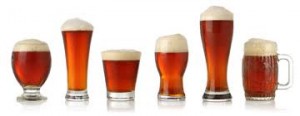 The last day or two were busy days in the beer world. There were a number of stories I was tempted to respond to on Twitter, but as I haven’t yet got the hang of that particular platform, I opted to desist. However, there are three stories I feel the need to fill readers in on.
The last day or two were busy days in the beer world. There were a number of stories I was tempted to respond to on Twitter, but as I haven’t yet got the hang of that particular platform, I opted to desist. However, there are three stories I feel the need to fill readers in on.
Saskatchewan Changes Mark-Up Rates
On Thursday the Saskatchewan government announced a shift in its mark-up rates (read the release here). For the most part it was an uncontroversial move. The local breweries spoke in favour of it and, in general, it will make small brewery craft beer cheaper in the province.
The new mark-up lowers the overall level and creates more steps as a brewery gets larger. They seem to have eliminated the bizarre differential between bottle and keg product. The lowest rate is now 40 cents/litre, compared to 66/98 cents. The lowest rate applies only to breweries smaller than 2,500HL per year, which is still a rather low threshold. The mark-up slowly increases as you work your way up to 70 cents at 20,000HL. At that point it sits at 75 cents/HL until you reach 200,000HL. After that the full rate of $1.565 (who does a 1/2 cent??) applies.
This is a more progressive arrangement than the previous policy, which was pretty punishing for breweries trying to jump to the next level. Overall, Saskatchewan’s mark-ups are still higher than average, but at least they are acknowledging the need for a lower mark-up for small breweries.
They huge space between 20,000 and 200,000 HL for the second-highest rate is noteworthy. There is no question this is a “Great Western Rule” to give them maximum advantage. I am not saying this is bad – they are still a small regional player that deserves support – but the policy is a bit obvious in its ambition. Plus, the 200,000 mark for applying the full rate is not all that different from other jurisdictions.
Of course, any Saskatchewan policy change will these days be interpreted in the context of the trade war between Alberta and Saskatchewan. But let it go, people. This is unrelated. The issues in the war are not associated with the specific mark-up rates in the province. It is about the other stuff the governments are doing.
The government recently changed other small policies to ease things for breweries, including allowing direct sales to retailers and allowing off-site retail locations.
Overall, likely a good move for Saskatchewan breweries.
 The CTF Gets Wrong End of Stick
The CTF Gets Wrong End of Stick
This is a story I wasn’t going to comment on, hoping it would quietly disappear. However some media outlets picked it up, meaning it became beer news. The other day the Canadian Taxpayers Federation (CTF) issued a press release (read the story here) revealing they received private emails from Molson Breweries indicating that they increased the price of their discount beer at the time of the new mark-up policy change in Alberta, even though they were not affected by the change (the full rate was already being applied to their product). Secondary documents hinted that Labatt’s were doing the same thing. Their actions were clearly about gouging consumers unnecessarily to generate additional profit.
To be honest, it is an interesting revelation. People are rightfully angered by this kind of opportunist behaviour on the part of a couple of the world’s largest beer corporations. But here is the problem. The CTF spun the revelation as a reason why the government should not have changed the mark-up policy. They rightly argued that Molson’s price increases were an insult to consumers, but they proceed to blame the government for Molson’s actions.
It seems to me they got the wrong end of the stick.
Molson and (probably) Labatt used the confusion associated with the change to increase their prices and increase their profit margins. Personally I would argue that is unethical behaviour, even if it is legal.
But the policy they took advantage of – whether you agree with it or not – was designed for specific reasons. Its goal was to shift the craft beer market to help Alberta breweries. It intentionally did not change the playing field for the big boys – in none of the changes did their competitive position get affected.
Blaming the government for the unethical actions of Molson-Coors and ABInbev (to name their multinational parent corporations) is illogical. It is basically saying the government should never act if there is a risk that a big corporation will find a way to use the new rules to their advantage.
The CTF press release reveals somethi8ng interesting.It is just disappointing the CTF uses the revelation to take aim at the government – which it opposes in general – rather than focus on the real meat of the issue – the corporate breweries plotting to increase their profit margin.
Wood Buffalo Wins Hearts and Minds
And to close on a good news story, there has been a tonne of interest in Wood Buffalo’s announcement that they are creating a whiskey from malt smoked by the tragic Fort McMuray fire. I even heard them on CBC’s As It Happens last night. The whiskey won’t be available for a while, but it is cool to hear them say most of the batch will be offered up for charitable purposes.
It shows a real community connection, which I have no doubt is intensified after the events of this last spring. Kudos to Wood Buffalo. And for those of you self-interested enough to try to get a bottle they are offering a variety of places where bottles can be purchased (for charity), including an E-Bay auction which has just started.


Leave a Reply